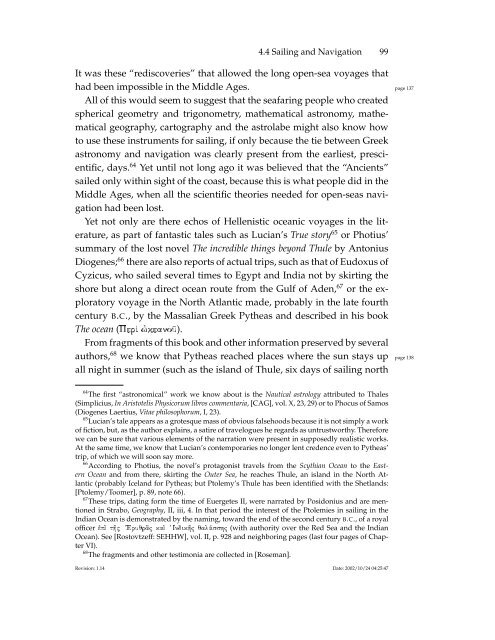1 The Birth of Science - MSRI
1 The Birth of Science - MSRI
1 The Birth of Science - MSRI
Create successful ePaper yourself
Turn your PDF publications into a flip-book with our unique Google optimized e-Paper software.
4.4 Sailing and Navigation 99<br />
It was these “rediscoveries” that allowed the long open-sea voyages that<br />
had been impossible in the Middle Ages. page 137<br />
All <strong>of</strong> this would seem to suggest that the seafaring people who created<br />
spherical geometry and trigonometry, mathematical astronomy, mathematical<br />
geography, cartography and the astrolabe might also know how<br />
to use these instruments for sailing, if only because the tie between Greek<br />
astronomy and navigation was clearly present from the earliest, prescientific,<br />
days. 64 Yet until not long ago it was believed that the “Ancients”<br />
sailed only within sight <strong>of</strong> the coast, because this is what people did in the<br />
Middle Ages, when all the scientific theories needed for open-seas navigation<br />
had been lost.<br />
Yet not only are there echos <strong>of</strong> Hellenistic oceanic voyages in the literature,<br />
as part <strong>of</strong> fantastic tales such as Lucian’s True story 65 or Photius’<br />
summary <strong>of</strong> the lost novel <strong>The</strong> incredible things beyond Thule by Antonius<br />
Diogenes; 66 there are also reports <strong>of</strong> actual trips, such as that <strong>of</strong> Eudoxus <strong>of</strong><br />
Cyzicus, who sailed several times to Egypt and India not by skirting the<br />
shore but along a direct ocean route from the Gulf <strong>of</strong> Aden, 67 or the exploratory<br />
voyage in the North Atlantic made, probably in the late fourth<br />
century B.C., by the Massalian Greek Pytheas and described in his book<br />
<strong>The</strong> ocean ( ).<br />
From fragments <strong>of</strong> this book and other information preserved by several<br />
authors, 68 we know that Pytheas reached places where the sun stays up page 138<br />
all night in summer (such as the island <strong>of</strong> Thule, six days <strong>of</strong> sailing north<br />
64 <strong>The</strong> first “astronomical” work we know about is the Nautical astrology attributed to Thales<br />
(Simplicius, In Aristotelis Physicorum libros commentaria, [CAG], vol. X, 23, 29) or to Phocus <strong>of</strong> Samos<br />
(Diogenes Laertius, Vitae philosophorum, I, 23).<br />
65 Lucian’s tale appears as a grotesque mass <strong>of</strong> obvious falsehoods because it is not simply a work<br />
<strong>of</strong> fiction, but, as the author explains, a satire <strong>of</strong> travelogues he regards as untrustworthy. <strong>The</strong>refore<br />
we can be sure that various elements <strong>of</strong> the narration were present in supposedly realistic works.<br />
At the same time, we know that Lucian’s contemporaries no longer lent credence even to Pytheas’<br />
trip, <strong>of</strong> which we will soon say more.<br />
66 According to Photius, the novel’s protagonist travels from the Scythian Ocean to the Eastern<br />
Ocean and from there, skirting the Outer Sea, he reaches Thule, an island in the North Atlantic<br />
(probably Iceland for Pytheas; but Ptolemy’s Thule has been identified with the Shetlands:<br />
[Ptolemy/Toomer], p. 89, note 66).<br />
67 <strong>The</strong>se trips, dating form the time <strong>of</strong> Euergetes II, were narrated by Posidonius and are mentioned<br />
in Strabo, Geography, II, iii, 4. In that period the interest <strong>of</strong> the Ptolemies in sailing in the<br />
Indian Ocean is demonstrated by the naming, toward the end <strong>of</strong> the second century B.C., <strong>of</strong> a royal<br />
<strong>of</strong>ficer (with authority over the Red Sea and the Indian<br />
Ocean). See [Rostovtzeff: SEHHW], vol. II, p. 928 and neighboring pages (last four pages <strong>of</strong> Chapter<br />
VI).<br />
68 <strong>The</strong> fragments and other testimonia are collected in [Roseman].<br />
Revision: 1.14 Date: 2002/10/24 04:25:47










